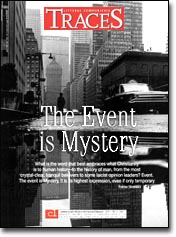
Traces N.3, March 2001
Event, Majesty of MysteryWe offer as this month’s editorial the notes of Father Giussani’s closing words to the CL National Council on Saturday, February 17th. They provide a further deepening of the thoughts expressed in February’s Word Among Us (“Charism and History”), concerning the great theme of the Event, particularly relevant to the life of the Movement at this time
I must express the great gratitude I feel toward each of you who has spoken, and also to each of you who is present today, because I would never have understood, without your companionship, I would never have understood the things that the Lord has made me understand in these days.
The word “event” covers all the vastness and puts at the center of everything all the dignity that the Christian fact raises up and lives in history.
There is an interesting detail, which I will tell you: we can never tell what form the event will take without the positive thing which is correction, and self-correction.
The event is not a product of intellectuality: it is a preference for a whole Fact.
As in the Hebrew conception, if one has to speak of Christianity as event, he cannot prepare a series of logical observations, logically expressed, because what the event signals is not so much a logic, but majesty, the majesty of Mystery: the event is Mystery, it is its highest expression, even if only temporary. I hope to be able to discuss this with you as well. But I wanted to speak now so that your awareness and your ethical conscience may feel the inexorable urging of the Lord, who made us for Himself.
The Lord made us for Himself; He is the One of whom St. Paul says that all the universe is made of Him.
My wish for you is that the tension with which you have worked in these months may not hide the greatness and luminosity of your commitment, that it may not keep them hidden, but that we, you and I, may be the first to feel its fruitfulness.
That our Movement, that our charism is something great in history, in the history of mankind, appears to us now as a real prospect, a real possibility. However, it is not fulfilled if every day of our lives does not make provision for the relationship with God toward which our conscience leads us and the moral relationship our conscience makes us live in our dealings with other men. I would like, as it were, I would like to start all over again. What is the word that best embraces what Christianity is to human history–to the history of man, from the most crystal-clear, tranquil believers to some laicist opinion leaders like Galli della Loggia and Scalfari? Event.
We must wish this for ourselves; this is the wish that one, saying the Holy Mass every morning, or the last words at night, the last words at the end of Compline, wishes for himself as his destiny, because everything in his life is assigned by the Lord to Whom he belongs, and one is so free, so intensely free, because nothing makes us feel as superior to others as the fact of belonging to God. This is the heart of our human experience.